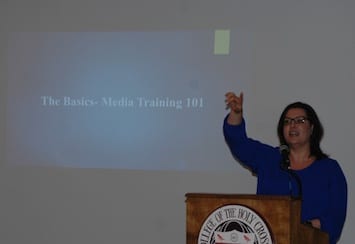
Media relations consultant Nicole Kieser
Auburn Town Manager Julie Jacobson and communications and media relations consultant Nicole Kieser spoke about mastering the art of town communications during one of several breakout sessions held at the Massachusetts Selectmen’s Associations Fall Conference on Oct. 29 in Worcester.
Focusing on a town’s interaction with media outlets, Kieser said that the most important aspects of a strategy are to be proactive, know your audience, and stay on message.
Before speaking with any media outlet, leadership should determine three things:
• Who is the audience?
• What is the headline?
• Have you practiced your messaging in advance?
“Developing relationships with local media and reporters can also go a long way,” Kieser said.
In a crisis situation, it is important for town officials to be on the same page and have a designated spokesperson who is comfortable being in that role, Kieser said.
Social media has an important role to play in a community’s communications strategy and can be a way to establish a trusted mode of communication with residents and the media.
“If you are in a crisis situation, planning ahead and using social media platforms will help you disseminate information easily,” Kieser said.
Jacobson spoke about her town’s multilayer communications strategy and the various media outlets they use.
“Different age groups rely on different media sources,” Jacobson said. “You want to address them all.”
Social media allows for getting information out in real-time while fostering community engagement and interaction, Jacobson said. Auburn uses Facebook, Twitter and YouTube. The town regularly posts about meetings, activities in the community, emergency communications, and Public Works notifications.
Kieser and Jacobson stressed the importance of local governments getting their message out directly to the community.
Jacobson suggested taking advantage of the analytics offered by social platforms in order to plan posts around the highest-traffic times of the day and to see what information is grabbing the community’s attention. She also suggested using a post-scheduling program.
Auburn also uses a printed quarterly magazine (also found online), a local radio station for emergencies, a reverse 911 CodeRed system, its website, and cable television. The town is developing a smartphone app to complement its communications strategy.
“Having so many layers of communication enhances transparency,” Jacobson said. “It fosters awareness of municipal government and lets you tell your story.”
Jacobson addressed the importance of a communications strategy during an emergency situation. The more information a town can get out during a crisis, the fewer phone calls officials will have to deal with – and that is critical, Jacobson said.
“If you’re putting the information out there, the public knows it’s verifiable, it’s factual,” she said.
During emergencies, Auburn has one person in its IT department who coordinates the town’s social media efforts to keep messages clear, concise and consistent.
Jacobson said it is important for a town using social media platforms to have a written policy regarding their use and to have designated employees with access to the platforms. Cities and towns should also have an acceptable use policy for employees.
Local governments also need to be aware of the open meeting law, public records law, and First Amendment rights when crafting their social media policies.
